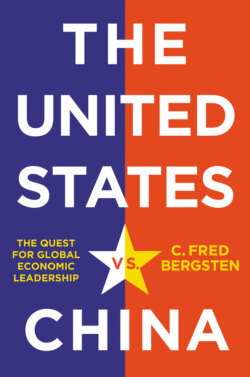Читать книгу The United States vs. China - C. Fred Bergsten - Страница 23
Recent Systemic Cooperation
ОглавлениеSeveral examples of effective systemic cooperation between China and the United States can also be observed. They both contributed to an effective resolution of the Asian financial crisis in 1997–8, the United States mainly through the IMF, and China by avoiding any devaluation of its own currency, which would have greatly intensified the contagion of the period. (They both rejected Japan’s proposal for an Asian Monetary Fund, killing an idea that could indeed have challenged the existing architecture but that has come back in modified form via the Chiangmai Initiative Multilateral supported by both China and Japan.)
They adopted parallel fiscal and monetary stimulus measures in response to the global financial crisis a decade later, effectively rescuing the world economy. They largely resisted protectionist impulses, avoiding the extensive erosion of the global trading system that was widely feared. They consulted actively on containing the euro crisis. China and the United States collaborated to conclude the Paris Agreement on global warming in 2015 (subsequently repudiated by President Trump, but maintained by the rest of the world including China and rejoined by President Biden). Their Phase One agreement in early 2020 called at least a temporary truce in the trade war that was roiling the world economy.
These cooperative episodes fall far short of an ongoing G-2 co-leadership of the global order, which the two countries explored during 2005–9 and will be addressed in chapter 9. They do, however, indicate the potential for such cooperation. They also reveal the willingness of China to exercise effective leadership, at least when the system on which it relies so heavily seems to be at risk.
A more subtle example of Chinese systemic attitudes may be currency manipulation. China intervened massively in the foreign exchange markets during 2003–13, buying about $4 trillion to limit the appreciation of the RMB. It kept the RMB undervalued by as much as 30–40 percent, which was the major trade distortion of that period and (rather than China’s entry to the WTO) the major cause of the “China shock” to the US and some other economies, and pushed its global current account surplus to 10 percent of its GDP, an unprecedented level for a major trading country (Bergsten and Gagnon 2017). The United States urged China to desist, increasingly from about 2005 and with growing Congressional threats to take action, but never was willing to label China a “currency manipulator” as called for by US legislation, on the grounds that such a public confrontation would make it harder for China to accede, and to avoid risking Chinese cooperation on other issues.
China never admitted liability but, at least partially in response to US pressure, let the RMB begin to rise gradually, while still intervening heavily to limit the pace of appreciation, in 2005 and in 2010–11 again after the global financial crisis. The RMB eventually climbed by 40 percent against the dollar with a subsequent decline in the external global surplus to about 1 percent of GDP (though with continued growth of its bilateral surplus with the United States). Manipulation ceased by 2014, and in fact gave way to sizable intervention to limit depreciation of the currency in 2015, and there was no repetition of the practice after that time. The semi-annual reports of the Treasury Department concluded that China was no longer manipulating and Secretary Mnuchin’s embarrassing designation of China as a “manipulator” in August 2019 was clearly ordered by President Trump solely to fulfill a pledge he had made, without factual basis, during his Presidential campaign in 2016. That designation was undone in January 2020 under cover of the Phase One trade agreement between the two countries, in which China agreed to “enforceable obligations” against any future manipulation that it might undertake.
Thus, the major systemic problem of the early part of this century was resolved (though with sizable economic costs to the United States and other victims, especially during the difficult period of the global financial crisis, because of the delay in achieving the resolution). It will be crucial to see whether China will be willing to implement similar de facto responses over time to the US (and other foreign) complaints about its objectional trade policy practices.
